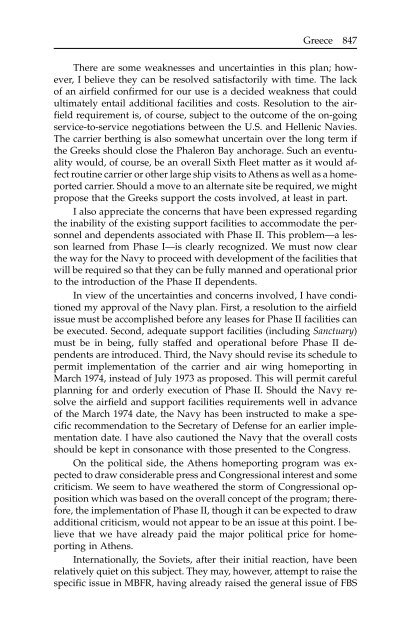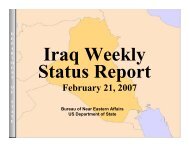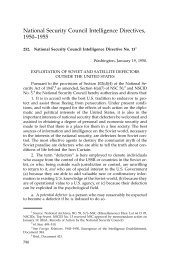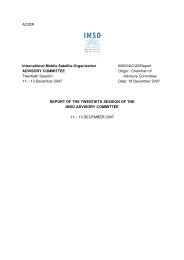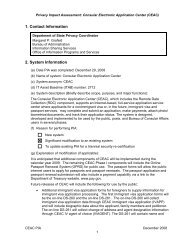Greece - US Department of State
Greece - US Department of State
Greece - US Department of State
Create successful ePaper yourself
Turn your PDF publications into a flip-book with our unique Google optimized e-Paper software.
<strong>Greece</strong> 847<br />
There are some weaknesses and uncertainties in this plan; however,<br />
I believe they can be resolved satisfactorily with time. The lack<br />
<strong>of</strong> an airfield confirmed for our use is a decided weakness that could<br />
ultimately entail additional facilities and costs. Resolution to the airfield<br />
requirement is, <strong>of</strong> course, subject to the outcome <strong>of</strong> the on-going<br />
service-to-service negotiations between the U.S. and Hellenic Navies.<br />
The carrier berthing is also somewhat uncertain over the long term if<br />
the Greeks should close the Phaleron Bay anchorage. Such an eventuality<br />
would, <strong>of</strong> course, be an overall Sixth Fleet matter as it would affect<br />
routine carrier or other large ship visits to Athens as well as a homeported<br />
carrier. Should a move to an alternate site be required, we might<br />
propose that the Greeks support the costs involved, at least in part.<br />
I also appreciate the concerns that have been expressed regarding<br />
the inability <strong>of</strong> the existing support facilities to accommodate the personnel<br />
and dependents associated with Phase II. This problem—a lesson<br />
learned from Phase I—is clearly recognized. We must now clear<br />
the way for the Navy to proceed with development <strong>of</strong> the facilities that<br />
will be required so that they can be fully manned and operational prior<br />
to the introduction <strong>of</strong> the Phase II dependents.<br />
In view <strong>of</strong> the uncertainties and concerns involved, I have conditioned<br />
my approval <strong>of</strong> the Navy plan. First, a resolution to the airfield<br />
issue must be accomplished before any leases for Phase II facilities can<br />
be executed. Second, adequate support facilities (including Sanctuary)<br />
must be in being, fully staffed and operational before Phase II dependents<br />
are introduced. Third, the Navy should revise its schedule to<br />
permit implementation <strong>of</strong> the carrier and air wing homeporting in<br />
March 1974, instead <strong>of</strong> July 1973 as proposed. This will permit careful<br />
planning for and orderly execution <strong>of</strong> Phase II. Should the Navy resolve<br />
the airfield and support facilities requirements well in advance<br />
<strong>of</strong> the March 1974 date, the Navy has been instructed to make a specific<br />
recommendation to the Secretary <strong>of</strong> Defense for an earlier implementation<br />
date. I have also cautioned the Navy that the overall costs<br />
should be kept in consonance with those presented to the Congress.<br />
On the political side, the Athens homeporting program was expected<br />
to draw considerable press and Congressional interest and some<br />
criticism. We seem to have weathered the storm <strong>of</strong> Congressional opposition<br />
which was based on the overall concept <strong>of</strong> the program; therefore,<br />
the implementation <strong>of</strong> Phase II, though it can be expected to draw<br />
additional criticism, would not appear to be an issue at this point. I believe<br />
that we have already paid the major political price for homeporting<br />
in Athens.<br />
Internationally, the Soviets, after their initial reaction, have been<br />
relatively quiet on this subject. They may, however, attempt to raise the<br />
specific issue in MBFR, having already raised the general issue <strong>of</strong> FBS


